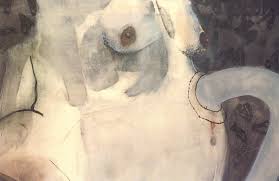Baby dreams
of milk
Baby smiles
Baby croons
Baby says eyayeeyaeyooyey
In sleep.
In baby’s dream
A pair
Of boobs
Swell.
Twin springs
Of milk
Gush.
gums wet tongue wet mouth wet
thick thick milk wet.
gurgles baby.
glob of cream slab of butter
glands furiously turn
blood to food in the factory of love
desalting distilling reforming refining
in centrifugal pumps pipes chutes taps.
In baby’s dream flow rivers of milk
where swim milk fish
sprout milk trees
bathe milk mammas
bloom hundred boobs like milk bubbles.
Milk baby dreams a booby trapped dream
Where a milk bomb explodes
Into white white stars.
Milk baby wakes up to
the Three Dukhas.*
• Buddha’s concept of the three Dukhas (sufferings) in
life– dukha of ordinary suffering, dukha of change and dukha of conditioned
states.

River of Milk -- Helen Sargeant
River of Milk -- Helen Sargeant
The Aryans were nomadic breeders of horses and cattle breeding who took Sanskrit to India. "Du" was a prefix indicating bad or difficult, while "kha" meant "empty" or "hole," especially the axle hole. So, "duhkha" meant "having a poor axle hole," leading to a bumpy, jolting ride. More abstractly, "empty" means devoid of permanence and not having a self that can control one's condition or environment. The Buddha said: "I have taught one thing and one thing only, duhkha and the cessation of duhkha." (He also claimed, "What ordinary folk call happiness, the enlightened ones call dukkha.") In the doctrine of the Four Noble Truths, the Truth of Dukkha (duḥkha-satya) is identified as the first. It is commonly explained according to three categories: Dukkha-dukkha (ordinary suffering), the obvious physical and mental suffering associated with birth, growing old, illness, and dying; Vipariṇāma-dukkha (dukkha produced by change), the stress of trying to hold on to things that are constantly changing; and Saṃkhāra-dukkha (dukkha of conditioned states), the basic dissatisfaction that pervades existence because they all change and are impermanent, without any inner core or substance. On this level, the term indicates a lack of satisfaction, a sense that things never measure up to our expectations or standards. Duhkha may be overcome through meditation and compassion. In Hindu literature, the earliest Upaniṣhads only used the term twice: The "Bṛhadāraṇyaka Upaniṣhad" stated, "While we are still here, we have come to know [ātman]. If you've not known it, great is your destruction. Those who have known it — they become immortal As for the rest — only suffering awaits them;" and the "Chāndogya Upaniṣhad" said, "When a man rightly sees, he sees no death, no sickness or distress. When a man rightly sees,
ReplyDeletehe sees all, he wins all, completely." So early Hinduism,like the later Buddhism, emphasized that a transcendent understanding was necessary to overcome the condition. In 1988, Ralph G. H. Siu proposed a new psychological discipline called panetics, to be devoted to the study of the infliction of suffering, with the "dukkha" as a semi-quantitative unit of measurement of suffering.